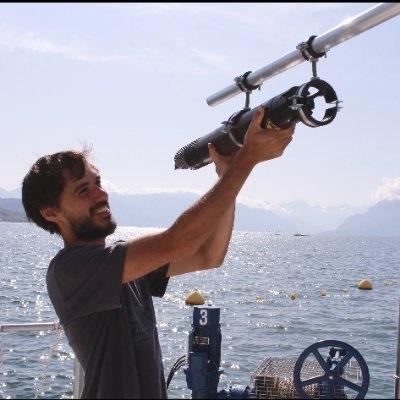Project overview
Vertical turbulent mixing is a key process for ocean dynamics and has a major influence on climate, by controlling the pace at which the vast deep ocean reservoir exchanges heat and carbon dioxide with the atmosphere. However, turbulent mixing is also one of the less understood ocean processes due to the technical challenges involved in sampling its small spatial- and short timescales. In the early 2000's, the start of the international Argo programme represented a turning point in ocean observation with the deployment of thousands of autonomous profiling floats (https://argo.ucsd.edu). The continuously maintained global array of about 4000 floats has monitored ocean temperature and salinity across the World's Oceans ever since. Twenty years later, we are on the verge of a comparably important breakthrough.
Leaders in climate science have recognised the need of documenting the spatial and temporal patterns of ocean mixing, and the opportunities for this through integration of turbulence sensors in the Argo programme (Roemmich et al., Frontiers in Marine Science, 2019). Currently, Rockland Scientific (RS) – the World leading manufacturer of turbulence-measuring instruments –, together with NKE Instrumentation (NKE) – one of the main profiling float manufacturers for the Argo programme, and the single one in Europe –, are developing a turbulence-measuring prototype (FloatRider) designed for integration on autonomous profiling floats. With initial tests at sea due early 2023, an active collaboration between engineers at RS and NKE, and ocean scientists is now timely and key to success.
The goal of the OMIPRO project is to open an avenue for collaboration between the leading experts in ocean turbulence at the University of Southampton and the FloatRider manufacturers (RS and NKE), to address the remaining challenges for the integration of the FloatRider on profiling floats, thus paving the way for their large-scale deployment at sea. Specifically, OMIPRO will address one of the main obstacles for measuring turbulence from autonomous floats: the need of dealing with the large volume of data required to characterise turbulence. Traditionally, turbulence is measured with tethered instruments and the data is transmitted via cable to a ship, where it is processed and reduced to bulk turbulence estimates with lower vertical resolution. Instead, the float data are transmitted via satellite, and must be processed onboard before transmission. However, turbulence data are complex, and the processing is not fully automated yet, often requiring expert supervision. The project lead (Dr Fernández Castro) has over 10 years of experience in turbulence observations, and he has contributed to improve the standard processing algorithms (Piccolroaz et al., Scientific Data, 2021).
The HEI fund will allow to leverage this expertise to develop, test and improve the algorithms for turbulence data processing onboard the FloatRider, and the integration between the FloatRider and the float, through successive iterations with NKE and RS. To this end, Dr Fernández Castro will travel twice to Villefranchesur-Mer (France) to join the first test deployments at sea and to participate in a workshop, which will bring together the manufacturers, the world-leading French biogeochemical-Argo community and the physical oceanography community represented by the University of Southampton.
Leaders in climate science have recognised the need of documenting the spatial and temporal patterns of ocean mixing, and the opportunities for this through integration of turbulence sensors in the Argo programme (Roemmich et al., Frontiers in Marine Science, 2019). Currently, Rockland Scientific (RS) – the World leading manufacturer of turbulence-measuring instruments –, together with NKE Instrumentation (NKE) – one of the main profiling float manufacturers for the Argo programme, and the single one in Europe –, are developing a turbulence-measuring prototype (FloatRider) designed for integration on autonomous profiling floats. With initial tests at sea due early 2023, an active collaboration between engineers at RS and NKE, and ocean scientists is now timely and key to success.
The goal of the OMIPRO project is to open an avenue for collaboration between the leading experts in ocean turbulence at the University of Southampton and the FloatRider manufacturers (RS and NKE), to address the remaining challenges for the integration of the FloatRider on profiling floats, thus paving the way for their large-scale deployment at sea. Specifically, OMIPRO will address one of the main obstacles for measuring turbulence from autonomous floats: the need of dealing with the large volume of data required to characterise turbulence. Traditionally, turbulence is measured with tethered instruments and the data is transmitted via cable to a ship, where it is processed and reduced to bulk turbulence estimates with lower vertical resolution. Instead, the float data are transmitted via satellite, and must be processed onboard before transmission. However, turbulence data are complex, and the processing is not fully automated yet, often requiring expert supervision. The project lead (Dr Fernández Castro) has over 10 years of experience in turbulence observations, and he has contributed to improve the standard processing algorithms (Piccolroaz et al., Scientific Data, 2021).
The HEI fund will allow to leverage this expertise to develop, test and improve the algorithms for turbulence data processing onboard the FloatRider, and the integration between the FloatRider and the float, through successive iterations with NKE and RS. To this end, Dr Fernández Castro will travel twice to Villefranchesur-Mer (France) to join the first test deployments at sea and to participate in a workshop, which will bring together the manufacturers, the world-leading French biogeochemical-Argo community and the physical oceanography community represented by the University of Southampton.
Staff
Lead researcher
Other researchers
